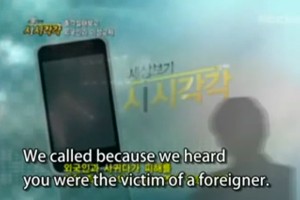 It isn’t totally uncommon for news agencies — even fairly reputable ones — to accidentally misreport news, or even to completely drop the ball when covering a breaking news story. Americans will recall how both CNN and Fox News, two of the largest and most turned-to news media outlets in the country, accidentally reported that President Obama’s healthcare mandate had been struck down by a Supreme Court ruling (in fact, the Court had voted 5-4 in favor of ObamaCare — in their haste to break the story first, the networks had misinterpreted the verdict). Breaking news is just that — breaking — and oftentimes it does take a few moments for the dust to settle before news agencies can accurately and fairly report stories.
It isn’t totally uncommon for news agencies — even fairly reputable ones — to accidentally misreport news, or even to completely drop the ball when covering a breaking news story. Americans will recall how both CNN and Fox News, two of the largest and most turned-to news media outlets in the country, accidentally reported that President Obama’s healthcare mandate had been struck down by a Supreme Court ruling (in fact, the Court had voted 5-4 in favor of ObamaCare — in their haste to break the story first, the networks had misinterpreted the verdict). Breaking news is just that — breaking — and oftentimes it does take a few moments for the dust to settle before news agencies can accurately and fairly report stories.
However, every once in a while there comes a journalism gaffe so profoundly stupid and consequential that it becomes indefensible, and no amount of excuse-making or finger-pointing can cover it up or explain it away.
The latest news network to become guilty of such a total lack of journalistic integrity? None other than Korean news network No Cut News, who had the total audacity to report that old-school K-pop group COOL member Yuri had been murdered while drinking at a bar with some friends. Apparently, the actual victim’s tangential connection to COOL was enough to prompt an unconfirmed breaking report of the murder, which was retracted only after some bright mind actually thought to phone Yuri’s agency and fact-check the story.
Younger K-pop fans may never have heard of COOL, but seasoned senior K-popaholics will remember them as one of the earliest and most influential K-pop groups. A mixed-gender group comprised of Yuri (who actually was not an original member, but promoted with the group after the release of their second album), rapper Kim Sung-soo, and lead vocalist Lee Jae-hoon, COOL debuted in 1994 and skyrocketed to fame as a result of their light-hearted and extremely popular dance tracks. The group disbanded in 2005 to pursue other endeavors, but reunited in 2008 to release a new album. A subsequent album was released in 2009. Despite initial misgivings about their ability to survive in the Korean music market, COOL has become one of South Korea’s most prolific and storied groups, having released a dozen albums over the course of a decade and then some. Though they haven’t exactly been super active (or really, super relevant) in recent years, contemporary K-pop owes much of its success to groups like COOL. Their legacy is assured, and many young adults today fondly recall growing up with COOL CDs in their stereos.
 Because COOL was (and is) so well-known in South Korea, the quickly-circulating news of Yuri’s supposed murder came as a cruel and unpleasant shock not only to fans, but to the entertainment industry at large. This shock was very obviously multiplied when, minutes later, No Cut News retracted the news story and reported that a woman had died after sustaining serious injuries in a bar altercation, but it was Kim Sung-soo’s ex-wife (identified as Ms. Kang) who had been the actual victim. Perhaps a collective sigh of relief was released, but it rapidly turned to outrage as it was revealed that No Cut News ran the story of Yuri’s brutal murder without actually bothering to confirm it. Upon hearing the initial news report, a representative of Yuri’s agency, WS Entertainment, frantically phoned the singer only to have her answer to phone — because she had been home the entire time, and utterly unaware that anything was being reported about her being dead. WS Entertainment later released a statement chastising No Cut News for their incredibly irresponsible reporting, arguing that one phone call to the agency was all it would have taken to avoid what has snowballed into an incredibly damaging fiasco.
Because COOL was (and is) so well-known in South Korea, the quickly-circulating news of Yuri’s supposed murder came as a cruel and unpleasant shock not only to fans, but to the entertainment industry at large. This shock was very obviously multiplied when, minutes later, No Cut News retracted the news story and reported that a woman had died after sustaining serious injuries in a bar altercation, but it was Kim Sung-soo’s ex-wife (identified as Ms. Kang) who had been the actual victim. Perhaps a collective sigh of relief was released, but it rapidly turned to outrage as it was revealed that No Cut News ran the story of Yuri’s brutal murder without actually bothering to confirm it. Upon hearing the initial news report, a representative of Yuri’s agency, WS Entertainment, frantically phoned the singer only to have her answer to phone — because she had been home the entire time, and utterly unaware that anything was being reported about her being dead. WS Entertainment later released a statement chastising No Cut News for their incredibly irresponsible reporting, arguing that one phone call to the agency was all it would have taken to avoid what has snowballed into an incredibly damaging fiasco.
It would be wrong to take this incident as proof that South Korea’s media is in desperate need of a serious makeover — after all, one bad apple ought not spoil the whole bunch, and coming to the conclusion that one errant reporter’s hideous mistake condemns South Korea’s entire news apparatus is comparable to believing that Fox News and CNN’s errors in reporting on the ObamaCare ruling indicate that American media outlets are not to be trusted. But frankly, this isn’t the first time in recent memory that something the Korean media has done has left me feeling outraged. Anyone remember that asinine and highly xenophobic “news” segment on the dangers of dating foreign men that MBC ran over the summer? Back then, I really thought it couldn’t get any worse. Alas, to be proven wrong.
 The Korean news industry on the whole seems to have serious, serious problems when it comes to responsible reporting and fact-checking — and despite the fact that this could be read as a generalization, it isn’t one that is entirely without merit. As an editorial on K-pop news blog NetizenBuzz expressed, news agencies have a tendency to publish articles and press releases (particularly those pertaining to the entertainment industry) without doing any sort of research on the content. More often than not, the editorial claims, what shows up on Korean news outlets (and American forums that translate these articles for English-speaking K-pop fans) are articles typed up by entertainment companies themselves and sent to reporters, who funnel them onto news outlets with little regard for the actual information being expressed in the article. Granted, many of these articles are puff pieces (you know, those ones that are nothing more than a “report” of IU‘s new selca that showcases her breathtaking fresh-faced beauty), but the precedent that this sort of journalistic behavior establishes — a precedent of lazy reporting and an aversion to fact-checking — is problematic and could possibly account for the shoddy journalism that led to the article on Yuri’s “murder” appearing on No Cut News’ website.
The Korean news industry on the whole seems to have serious, serious problems when it comes to responsible reporting and fact-checking — and despite the fact that this could be read as a generalization, it isn’t one that is entirely without merit. As an editorial on K-pop news blog NetizenBuzz expressed, news agencies have a tendency to publish articles and press releases (particularly those pertaining to the entertainment industry) without doing any sort of research on the content. More often than not, the editorial claims, what shows up on Korean news outlets (and American forums that translate these articles for English-speaking K-pop fans) are articles typed up by entertainment companies themselves and sent to reporters, who funnel them onto news outlets with little regard for the actual information being expressed in the article. Granted, many of these articles are puff pieces (you know, those ones that are nothing more than a “report” of IU‘s new selca that showcases her breathtaking fresh-faced beauty), but the precedent that this sort of journalistic behavior establishes — a precedent of lazy reporting and an aversion to fact-checking — is problematic and could possibly account for the shoddy journalism that led to the article on Yuri’s “murder” appearing on No Cut News’ website.
Another issue pertaining to the Korean media is the apparent ease with which money or affiliation can buy a news story. I’ve talked about media play before (particularly in the context of the T-ara debacle), but the fact that what one might consider to be a reputable news organization or website so clearly runs stories that demonstrate that they’ve been bought out by big business does irreparable damage to its image and credibility. Core Contents Media is believed to be behind a strange series of articles bashing KARA for their “inappropriate” wardrobe choices during their promotions for “Pandora” (even stranger, these articles only appeared on Newsen), while rookie group EXID‘s agency AB Entertainment has been accused of paying out large sums of money to get articles related to EXID pushed to the top of news portals’ trending lists. South Korean citizens themselves seem to be aware of this obvious media bias and leave comments on many news portals reflecting this awareness, but the fact that this has not precipitated a change in media practice is worrisome.
The problem doesn’t begin and end with entertainment companies, either — did you know that two of South Korea’s largest broadcasting companies, KBS and MBC, are essentially government-owned? The South Korean government owns 100% of KBS and 70% of MBC. Now tell me how you feel about getting any sort of unbiased news from either of these networks. It isn’t my place (nor is it the purpose of this post) to comment on connections (real or imagined) between politics and the South Korean media, but the smart news consumer deserves to know that certain networks in South Korea have incentives to portray news in a certain way that other networks may not have.
South Korea, listen up. Your journalistic credibility is going down the tubes. If you can report the death of a woman without even bothering to confirm her identity, I don’t want to know what else you are capable of. It isn’t that hard to check your facts, especially in the Information Age — nor should it be all that difficult to remember that your job is ultimately to report balanced news that is pertinent to the public. Stop giving me reason to doubt you. Until that happens, I guess I’ll just have to take everything I read with an exceptionally large grain of salt.
(Images: [1], [2], NetizenBuzz [1] [2] [3], Ask a Korean!, Jpop Asia, Newsen)


